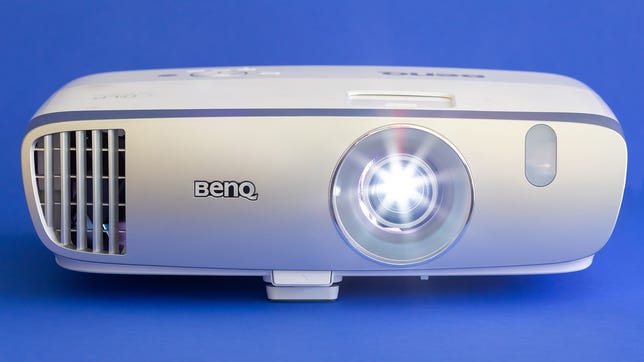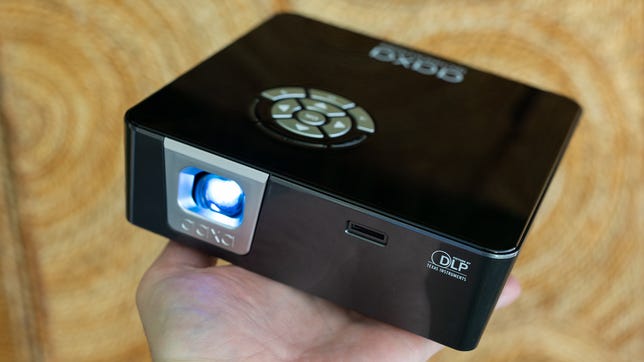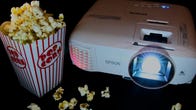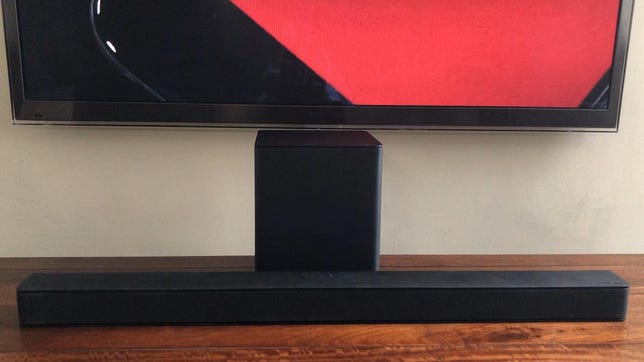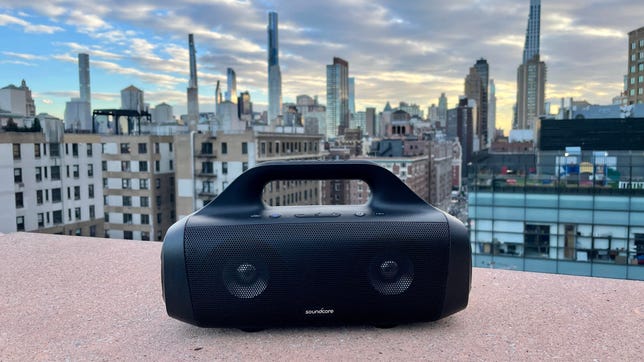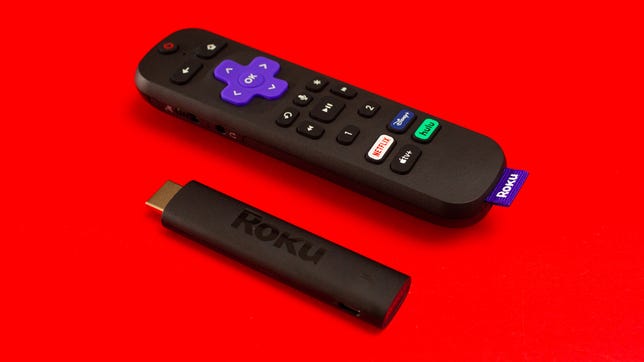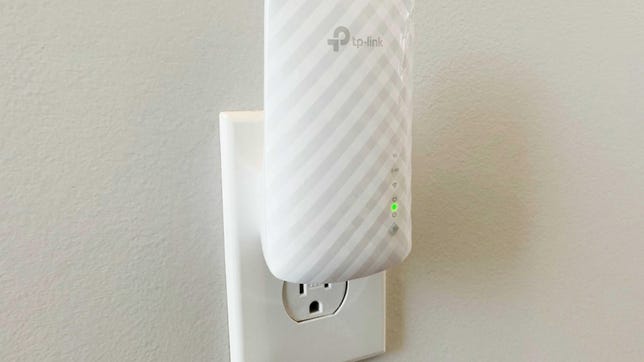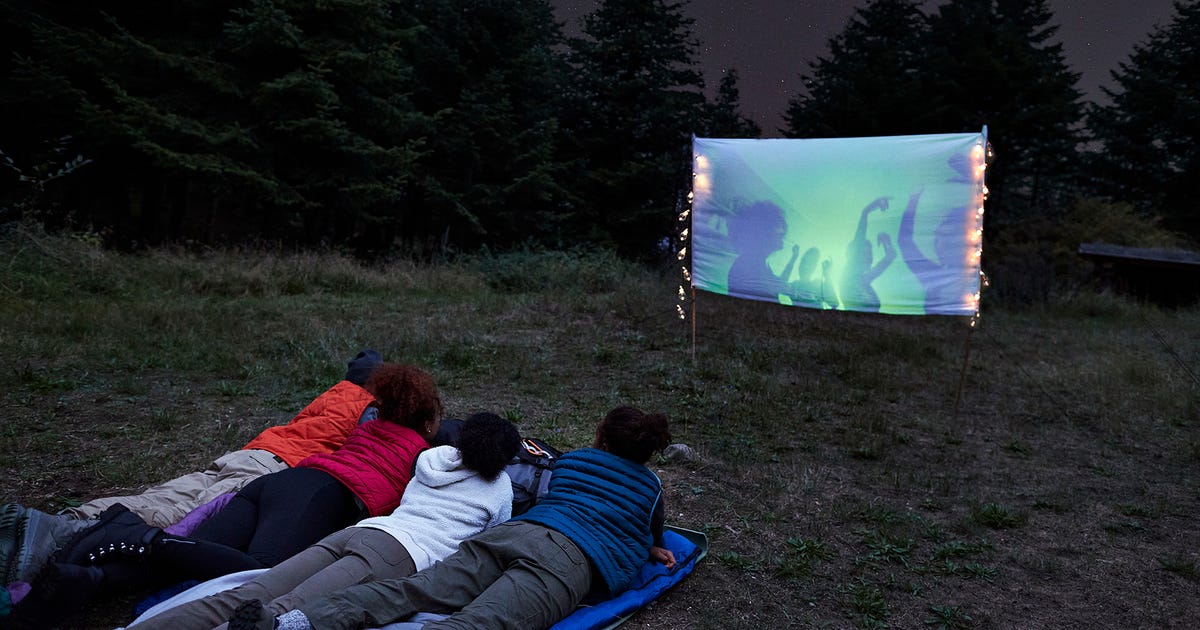
You don’t have to travel far to have a good time. It’s hard to beat a great cookout with friends, dinners on the patio or ghost stories around the fire pit, but you can use your outdoor oasis for so much more this fall — including big-screen entertainment. All it takes is a decent projector and a few other accessories, and you can transform your yard into your own personal drive-in theater for the perfect backyard movie night. Below are some ideas and product recommendations including outdoor projectors to help you set up movie night in your own backyard.
We’ve broken down our top projector and sound picks according to whether you’ll need power, like an extension cord or power station, or whether you intend to rely on the device’s built-in battery. You can also grab cushions, pillows and a lawn chair or two to accommodate as much seating as you need around the projection screen. Just don’t forget the popcorn, ice cream and other snack essentials.
Geoffrey Morrison/CNET
For the biggest movies, you’re going to need a projector. Any projector will work, but the brighter it is, the easier it will be to see the picture. That’s especially important outdoors, when even on a dark night some ambient light — from your neighbors, your deck lights or tiki torches — can affect the picture. Brightness also determines how large an image a projector can create. The BenQ HT2050A is the best projector for the money overall, and one of the reasons is its bright image.
To use this projector in the backyard, you’ll need to run a power cable. If you can’t do that or don’t want to bother, you’ll need a portable, battery-powered projector.
You’re receiving price alerts for BenQ CineHome HT2050A
There are plenty of other excellent plug-in projectors to choose from. Here’s a couple of alternatives for backyard movie night.
- Epson’s EF12 ($900) is smaller than the BenQ and has a better speaker built-in, although it’s not as bright.
- Optoma’s UHD35 ($1,300) is the best 4K projector for the money we’ve tested, and it’s more detailed and much brighter than the BenQ.
See our list of best outdoor projectors, best projectors and best 4K projectors for more options.
Geoffrey Morrison/CNET
This AAXA is the brightest portable, battery-powered projector we’ve ever tested, but it’s still dim compared to a plug-in projector. The BenQ HT2050A above, for example, measured more than three times as bright in our tests. If you don’t mind its (relatively) small, dim image, however, a projector like the AAXA can be a great backyard companion.
It’s a LOT lighter and more compact than most plug-in models, and the built-in battery lasts longer than most of its competitors. It’s also less than half the price of the BenQ and hundreds less than many other portable projectors, too. It lacks built-in streaming, but there’s an HDMI port and USB power so you can connect a streaming stick and remain wireless.
You’re receiving price alerts for AAXA P6X
As with their plug-in brothers, a number of other portable projectors make good alternatives. Here’s a couple that work well for backyard movies.
- The Anker Nebula Mars II Pro ($550) is our favorite outdoor projector overall. It’s dimmer than the AAXA but has a comparable battery, a better picture overall, a better-sounding speaker and built-in streaming.
- The Xgimi Halo Plus ($850) is more expensive but has better picture quality than the others, and its 1080p resolution delivers a sharper image.
See our list of the best portable mini projectors for other options.
Read more: 9 Tips to Set Up Your Projector Perfectly
Assuming you don’t have an outdoor TV already, you could bring your indoor TV outside. Keep in mind, however, that TVs are very delicate. One wrong twist and you can crack the screen. Even small TVs should be carried by two people. Treat it like you’re carrying a thin, expensive sheet of glass. Technically, that’s exactly what it is. You shouldn’t leave any regular TV outside. That’s sure to destroy it, and quickly.
You’re also not going to want to rely on any projector’s built-in speaker. Here are some options to let you hear the movie as well as see it.
If you’re using a traditional projector, you’re going to have to run electrical power. Since you’re running power anyway, why not just connect an actual speaker? A good soundbar will be significantly louder than a Bluetooth speaker, and probably sound a lot better too.
We like the inexpensive Vizio V21, which can connect via HDMI or analog and produces a surprising amount of bass for its size and price. More expensive soundbars might have better sound overall, but you can’t beat the Vizio for its combination of price and power.
You’re receiving price alerts for Vizio V21
Read more: Best Soundbar for 2022: Yamaha, Vizio, Sonos and More
Don’t forget that you’ll need a cable to connect it to the projector. Nearly all projectors have an analog audio output, which can connect to most soundbars, including Vizio. Some have HDMI, so you’ll need an HDMI cable from the soundbar to the projector.
David Carnoy/CNET
Anker’s $109 Soundcore Motion Boom is what Executive Editor David Carnoy calls a mini boombox speaker. It has a big handle, weighs a little over 4 pounds and even floats. A plug-in soundbar like the Vizio will sound better, but if you don’t want to run a cord, you’ll want something that sounds big and has a battery.
It’s not quite as loud as some bigger, more expensive options like JBL’s Boombox 2 ($500) and Ultimate Ears’ Hyperboom ($450), but it’s a lot louder than similarly priced compact BT speakers.
You’re receiving price alerts for Anker Soundcore Motion Boom
Read more: Best Bluetooth Wireless Speaker for 2022
Outdoor screen
We don’t have a specific suggestion here, but we do have a few tips while you’re looking.
Rigid-frame screens are more expensive and a little harder to assemble, but are more resilient against wind and typically have smoother screens for a better overall image.
Inflatable screens need to be secured to the ground, and any wind is going to set them rocking. However, they tend to be easier to set up and take down. Keep in mind that their fans run constantly, so in a smaller or enclosed yard, this can be annoying.
There are also infinite DIY options; basically anything fairly reflective and lacking color will work. It’s worth noting that you’ll be able to see any texture in the screen’s surface, so a garage door or the side of your house won’t be ideal because you’ll see any design, seams or imperfections.
Sarah Tew/CNET
The easiest way to get something to watch on your outdoor projector is via a streaming stick. Most modern projectors have a USB connection so you can connect a streaming stick without running an additional power cord.
We like the Roku Streaming Stick 4K for its ease of use and wide range of content options. It’s also a better choice than the Roku Express 4K Plus because it’s a streaming stick, not a small box. Or you can kill two birds — sound and streaming — by choosing the Roku Streambar.
You’re receiving price alerts for Roku Streaming Stick 4K
Read more: Best Streaming Device in 2022
This assumes your home’s Wi-Fi is strong enough to reach into your yard. If it’s not, we’ve got some ways to fix that, below.
Ry Crist/CNET
Depending where and how strong your Wi-Fi router is, you may not have enough signal to stream anything in your yard. You might be able to fix that: Check out the Wi-Fi tips in our article on how to improve internet speeds for Netflix, Hulu and more.
If none of those options works, consider a Wi-Fi extender. These connect to your main Wi-Fi, then broadcast essentially “more” Wi-Fi from a different point in your house. We like the inexpensive TP-Link RE220 (aka the AC750) best for backyard movie night. As Ry Crist said in his review, “Nothing else I tested was able to match [the RE220’s] level of performance, which makes the RE220 a steal at $30.”
You’re receiving price alerts for TP-Link RE220 Wi-Fi Range Extender
Or just tether your phone
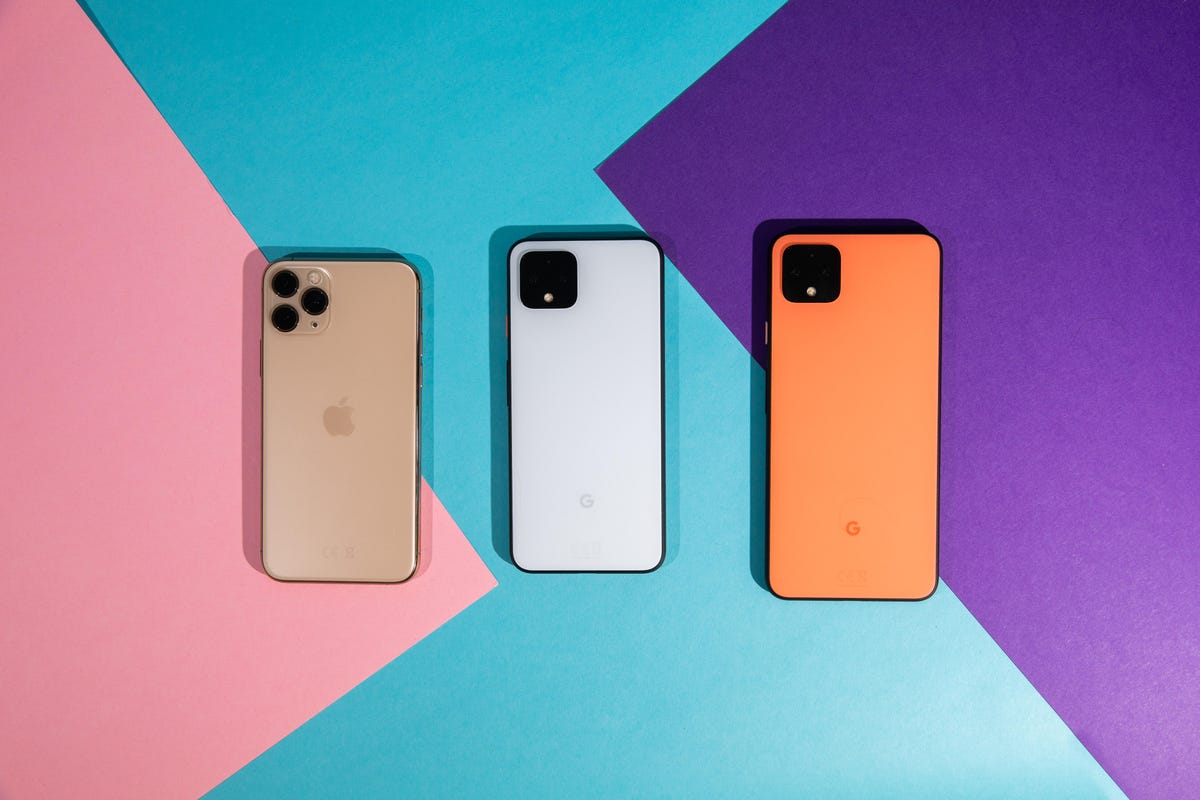
Andrew Lanxon/CNET
Another option that might work is to turn your phone into a Wi-Fi hotspot. This uses a cellular signal for internet, and then broadcasts a little Wi-Fi bubble near the phone. Streaming a movie chews through data, though, so make sure you’ve got plenty or are on an unlimited plan.
Most modern phones have a feature that lets you create a hotspot. Once it’s active, you just connect the streaming stick or projector to it just like it’s “normal” Wi-Fi. This guide is for connecting your iPad to your phone, but will work for connecting any device.
Keep in mind, too, that running a hotspot typically drains your battery fairly quickly, so you should also consider a USB battery pack, or plug it in via an extension cord.
Nonstreaming option: Blu-ray player or game console
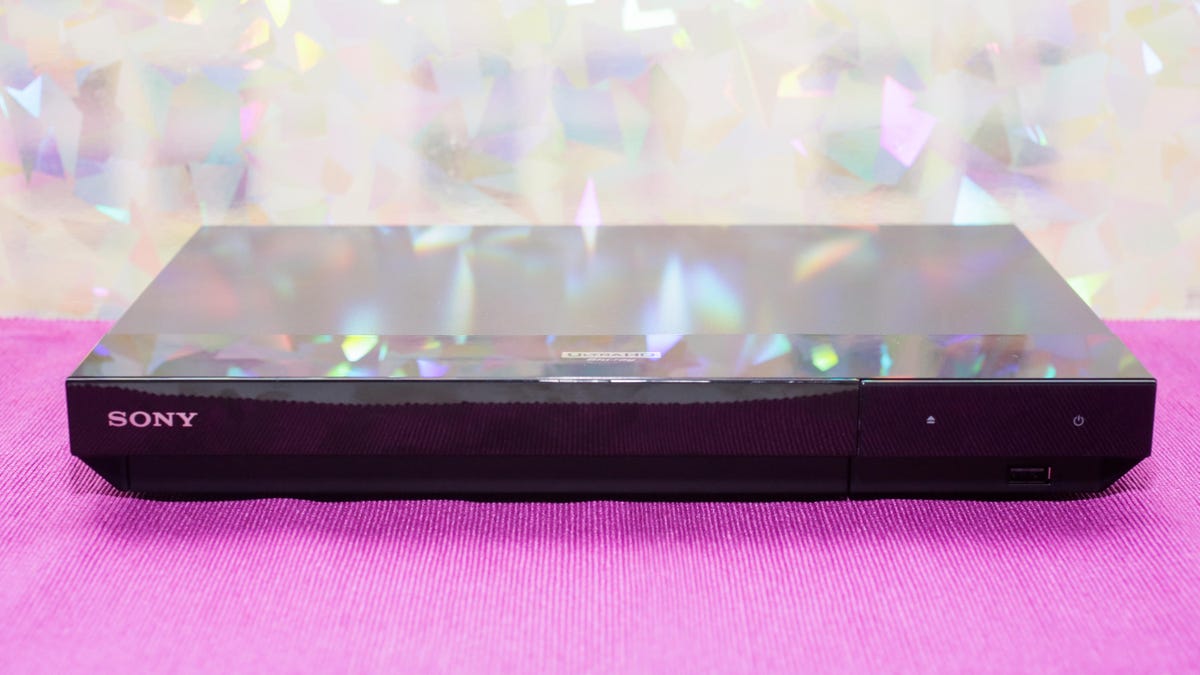
Sarah Tew/CNET
If your Wi-Fi isn’t strong enough to reach your makeshift theater, and you don’t want to burn through all your mobile data, Blu-ray players are very inexpensive and should have your viewing needs covered. You still have some discs, right?
For the most part we recommend getting a 4K Blu-ray player at this point. They’re only a little more expensive, will play standard DVDs and Blu-rays too, and 4K discs are the best way to take advantage of a 4K-compatible TV or projector (and I’m assuming you’ll be using this for indoor movie nights as well). The Sony UBP-X700 shown here is our pick for best 4K Blu-ray player.
Alternatively, you could get a PlayStation 5 or an Xbox Series X for some outdoor gaming on a huge screen. Both also play Ultra HD 4K Blu-rays.
Extension cord
Having one of these is important for any high-performance outdoor theater. The outdoor ones are far more rugged, so they should survive being stepped on no problem. I like the ones with three outlets at the end. It’s better to have too many than too few. Connecting this to a grounded or GFCI outlet is probably wise as well.
Or you could connect a power strip with a fuse in it, but these aren’t designed for use outside, so proceed at your own risk
Hammock

Hammocks Rada
Lastly, this is the thing that kept me sane through quarantine. Don’t underestimate the relaxing powers of a good hammock. You could get one from Hammock Hut, Hammocks-R-Us, Put-Your-Butt-There — really any will do. I’ve had one of these airy models for years and it has held up surprisingly well.
The only problem with watching a movie in one is that you’ll be asleep halfway through the second act. Nothing wrong with that.
As well as covering TV and other display tech, Geoff does photo tours of cool museums and locations around the world, including nuclear submarines, massive aircraft carriers, medieval castles, epic 10,000 mile road trips, and more. Check out Tech Treks for all his tours and adventures.
You can follow his exploits on Instagram and YouTube. He also wrote a bestselling sci-fi novel about city-sized submarines, along with a sequel.
More movie fun

